Brazil Indigenous Killings
“He is not here anymore, he loved his daughter. Now we gonna take this land”, says Jaquelina Ramires, 19-years-old, wiping a tear as she talks about her husband, Clodiodi Rodrigues de Souza, 26-years-old, an indigenous of the Guarani Kaiowa ethnic group, that was killed during a farmers attack in the city of Caarapo, Mato Grosso do Sul state, southwestern of Brazil, on June 14th.
Violent disputes for the lands -with gunfights and killings- are becoming very common in Brazil. Clodiodi was a health agent working in the Teyikue indigenous reserve and he was shot to death when he was trying to rescue injured people in an attack perpetrated by the local armed farmers, due a land occupation promoted by the Guarani Kaiowa people. The group had set up a camp in the Yvu farm to demand that claims to ancestral lands be recognized by the government.
According the CIMI, Conselho Indigena Missionario, that reads in Portuguese Missionary Indigenous Council, since 2003 to 2016 are reported 757 deaths due the dispute for the lands. More than a half, 393 of the total, occurred only in Mato Grosso do Sul.
“It is a massacre executed (by the farmers), in open air, with the Government’s negligence”, says Matias Rempel, 31-years-old missionary of CIMI that is working for the last 2 years in the region.
The historical rights of the indigenous people still need to be recognised by the authorities at the same time that the country has to “make peace with the past and admit those mistakes, those violations and promote proper reparations… Brazil is maybe one of few countries that has not yet made peace with its past that is absolutely genocidal”, explains the Brazilian federal attorney, Marco Antonio Delfino de Almeida, 48-years-old.

The indigenous Guarani Kaiowa, Jaquelina Ramires, 19, stands under a lamp for the picture in her cousin's house as she holds her baby in Caarapo, Mato Grosso do Sul state, Brazil, Saturday, June 18, 2016. "He is not here anymore, he loved his daughter. Now we gonna take this land”, says Ramires, as she talks about her husband, Clodiodi Rodrigues de Souza that was killed during a farmers attack on June 14th. (Photo/Leo Correa/Redux)
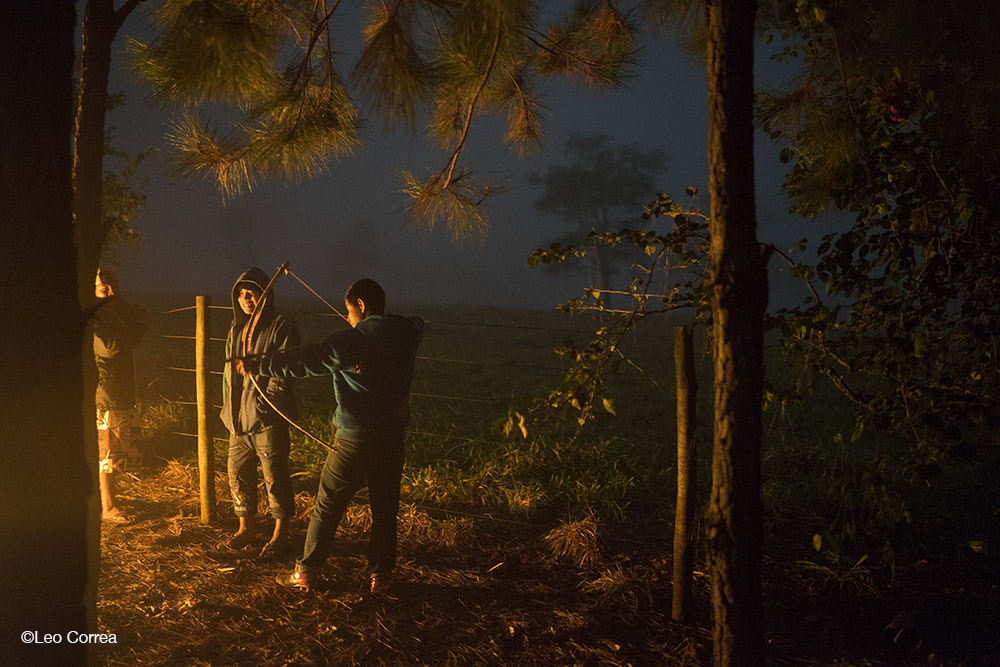
A Guarani Kaiowa indigenous aims his arrow and bow next to the fire as he stands in vigilance, with others indigenous, to alert his group in case a farmers attack at the occupied Yvu farm in Caarapo, Mato Grosso de Sul state, Brazil, Sunday, June 19, 2016. Violent disputes for the lands -with gunfights and killings- are becoming very common in Brazil. Clodiodi Rodrigues de Souza was a health agent working in the Teyikue indigenous reserve and he was shot to death when he was trying to rescue injured people in an attack perpetrated by the local armed farmers, due a land occupation promoted by the Guarani Kaiowa people. (Photo/Leo Correa/Redux)
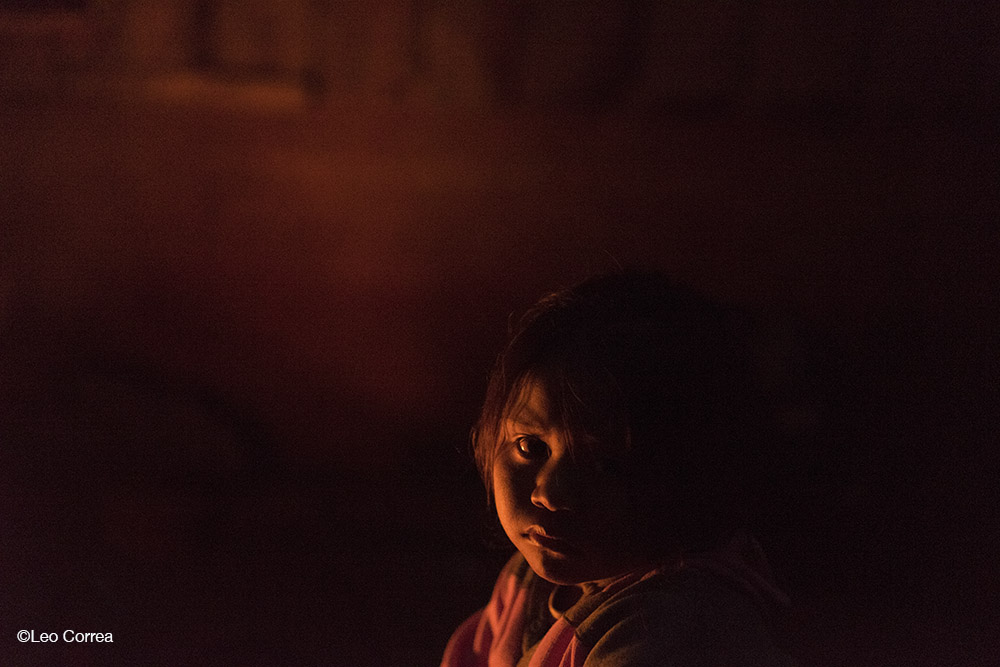
A little Indigenous girl of the Guarani Kaiowa ethnic group looks to the camera as she stands next to the fire at a camp in the Yvu farm Mato Grosso de Sul state, Brazil, Sunday, June 19, 2016. Since the FUNAI's study was published the Guarani Kaiowas started a movement to return to their ancient land in several actions of retaking the lands. After the death of Clodiodi Rodrigues de Souza they are risking their lives in, at least, 10 retakings areas of which they call Tekoha, that means in Guarani language. (Photo/Leo Correa/Redux)

An Indigenous of the Guarani Kaiowa ethnic group looks at her cellphone as she lies on the grass with other indigenous during the night at a camp at the Yvu farm in Mato Grosso de Sul state, Brazil, Sunday, June 19, 2016. In this process that the indigenous of the Guarani Kaiowa ethnic group is going through along the Brazilian History, there is a lack of recognition of their rights for the lands. Since a law was proclaimed by the 1988's Constitution there are still to much to do for those who live in the 0,2% of the total area of the Mato Grosso state. (Photo/Leo Correa/Redux)
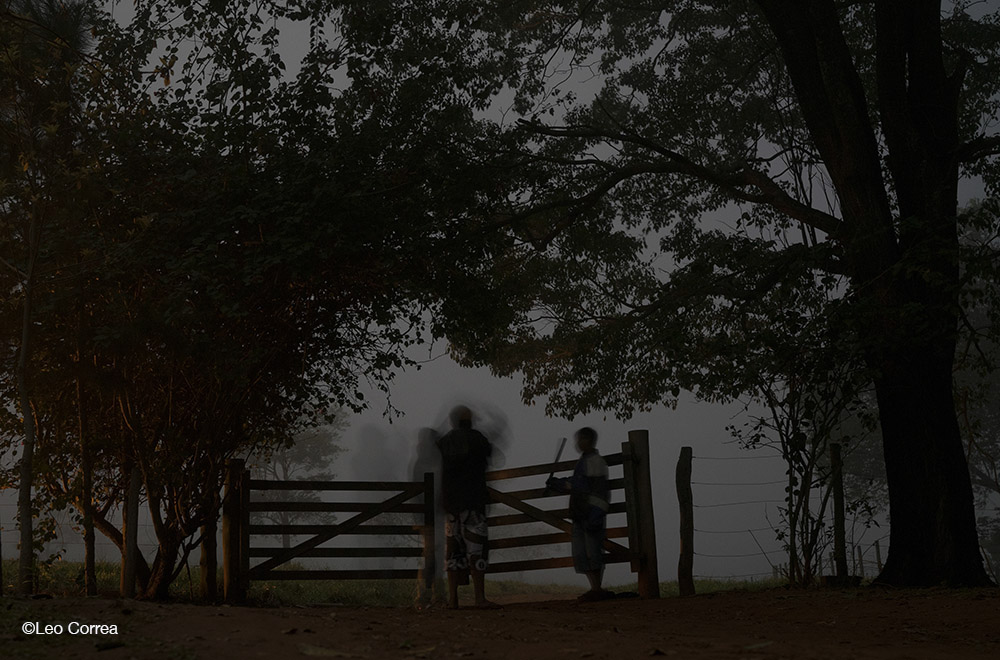
For this photo captured using a long exposure Guarani Kaiowa indigenous stand in surveillance at a entrance of the occupied Yvu farm to alert his group in case a farmers attack in Caarapo, Mato Grosso de Sul state, Brazil, Sunday, June 19, 2016. Violent disputes for the lands -with gunfights and killings- are becoming very common in Brazil. Clodiodi Rodrigues de Souza was a health agent working in the Teyikue indigenous reserve and he was shot to death when he was trying to rescue injured people in an attack perpetrated by the local armed farmers, due a land occupation promoted by the Guarani Kaiowa people. (Photo/Leo Correa/Redux)
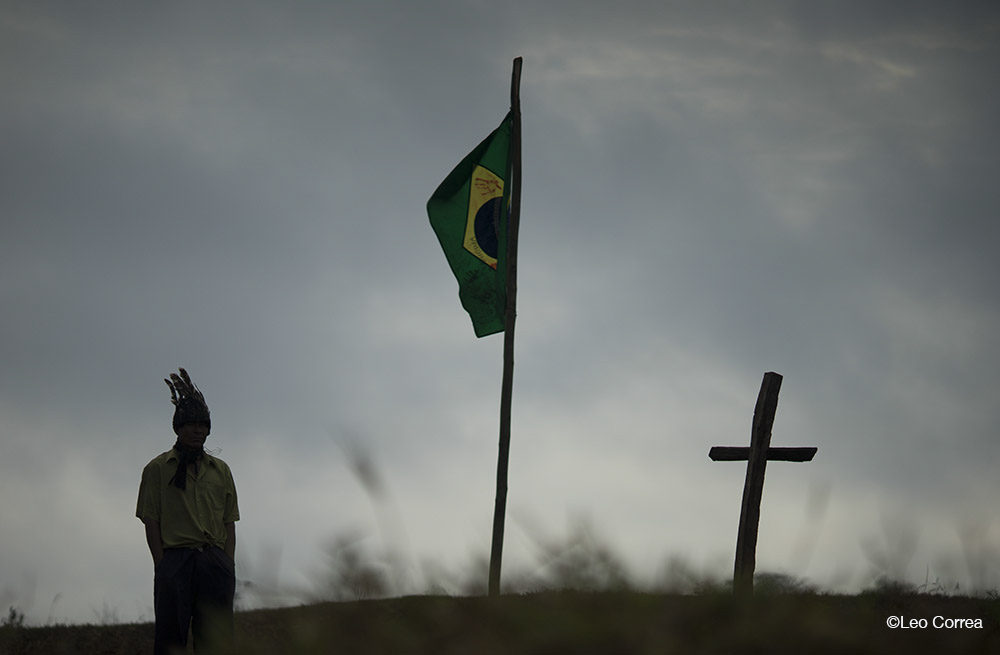
An indigenous of the Guarani Kaiowa ethnic group stands next to the burial place of the body of Clodiodi Rodrigues de Souza, that was killed during a farmers attack at Ivu farm in Caarapo, Mato Grosso do Sul state, Brazil, Wednesday, June 22, 2016. According the CIMI, Conselho Indigenista Missionario, that reads in Portuguese Missionary Indigenous Council, since 2003 to 2016 are reported 757 deaths due the dispute for the lands. More than a half, 393 of the total, occurred only in Mato Grosso do Sul. (Photo/Leo Correa/Redux)
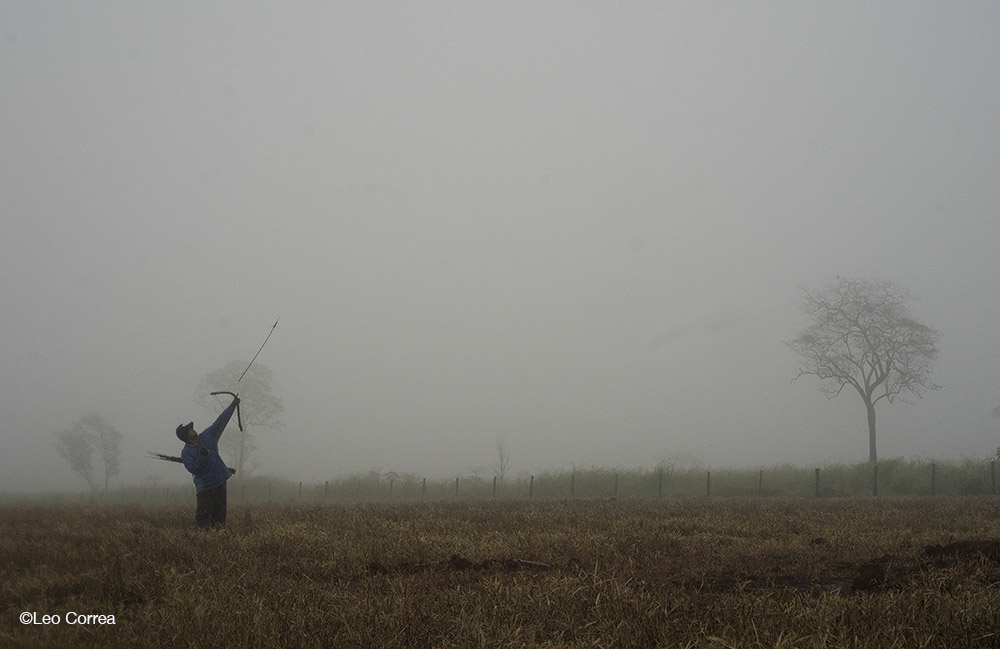
An Indigenous of the Guarani Kaiowa ethnic group shoots up an arrow during the dawn at the occupied Yvu farm in Caarapo, Mato Grosso de Sul state, Brazil, Sunday, June 19, 2016. The group had set up a camp in the Yvu farm to demand that claims to ancestral lands be recognized by the Government. (Photo/Leo Correa/Redux)
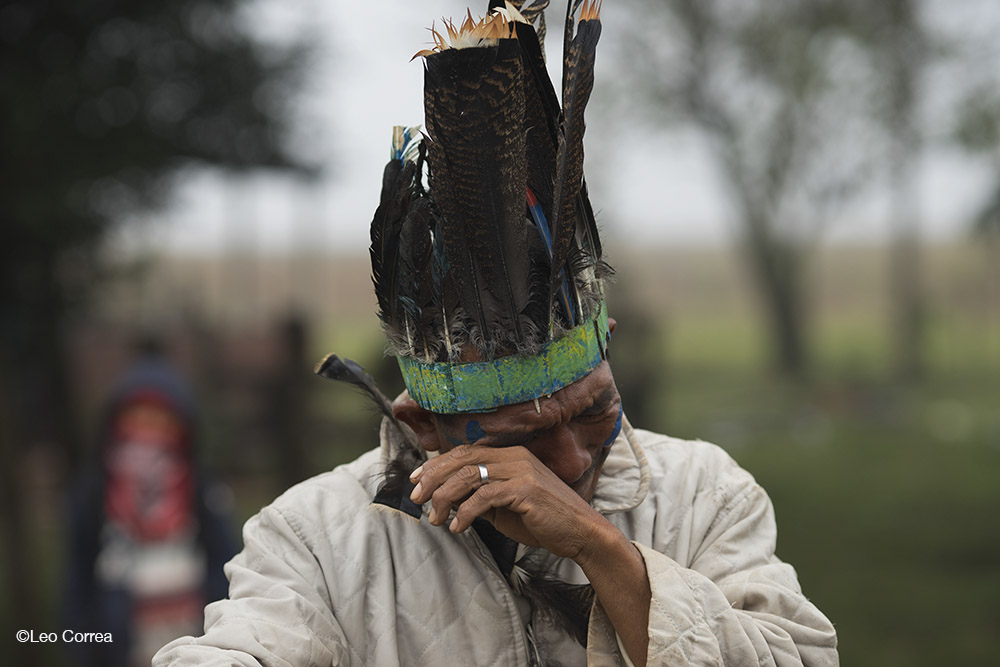
The Guarani Kaiowa indigenous Andemar Mendes, 46, wipes a tear as he talks about the death of Clodiodi Rodrigues de Souza during a farmers attack in Caarapo, Mato Grosso de Sul state, Brazil, Sunday, June 19, 2016. “We will resist until the final moment and there will be bloodshed. The only way to guarantee our land is doing our retaking areas”, announces Mendes. (Photo/Leo Correa/Redux)
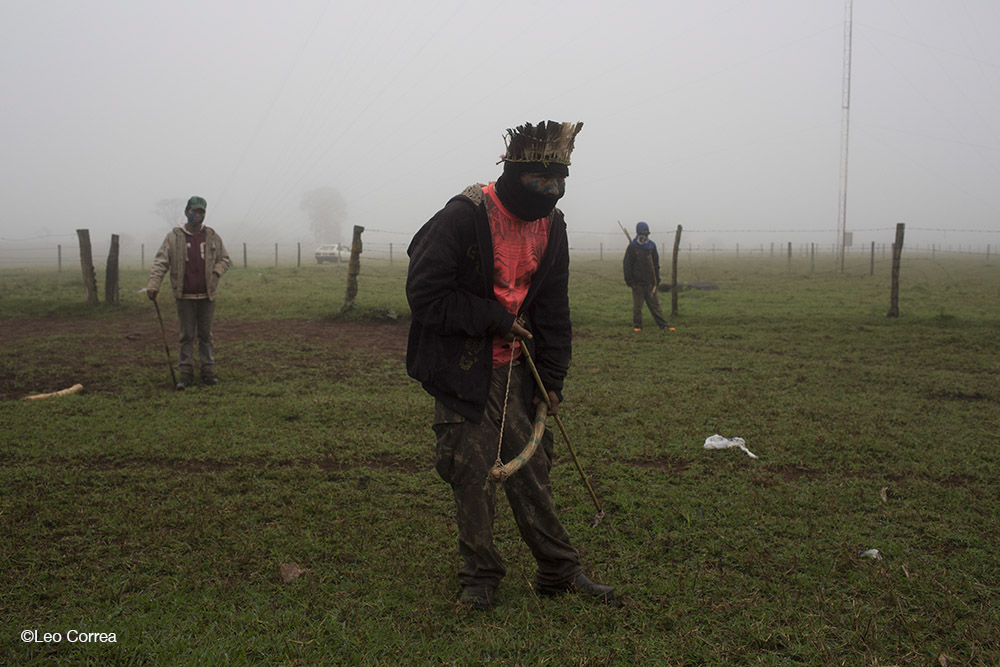
A Guarani Kaiowa indigenous holds his arrow and bow next to the others indigenous, as they stand in guard to alert his group in case of a farmers attack at an occupied farm in Caarapo, Mato Grosso de Sul state, Brazil, Sunday, June 19, 2016. "It is a massacre executed (by the farmers), in open air, with the Government's negligence", says Matias Rempel, 31-years-old missionary of CIMI that is working for the last 2 years in the region. The farmers are organizing themselves in armed militias and the indigenous are "suffering with the paramilitary attacks and even so, Brazil opens the doors for the Olympic Games and World Cup”. (Photo/Leo Correa/Redux)

A Guarani Kaiowa indigenous poses for the picture as he stands in guard to protect his group in case of a farmers attack at an occupied farm in Caarapo, Mato Grosso de Sul state, Brazil, Sunday, June 19, 2016. "It is a massacre executed (by the farmers), in open air, with the Government's negligence", says Matias Rempel, 31-years-old missionary of CIMI that is working for the last 2 years in the region. The farmers are organizing themselves in armed militias and the indigenous are "suffering with the paramilitary attacks and even so, Brazil opens the doors for the Olympic Games and World Cup”. (Photo/Leo Correa/Redux)
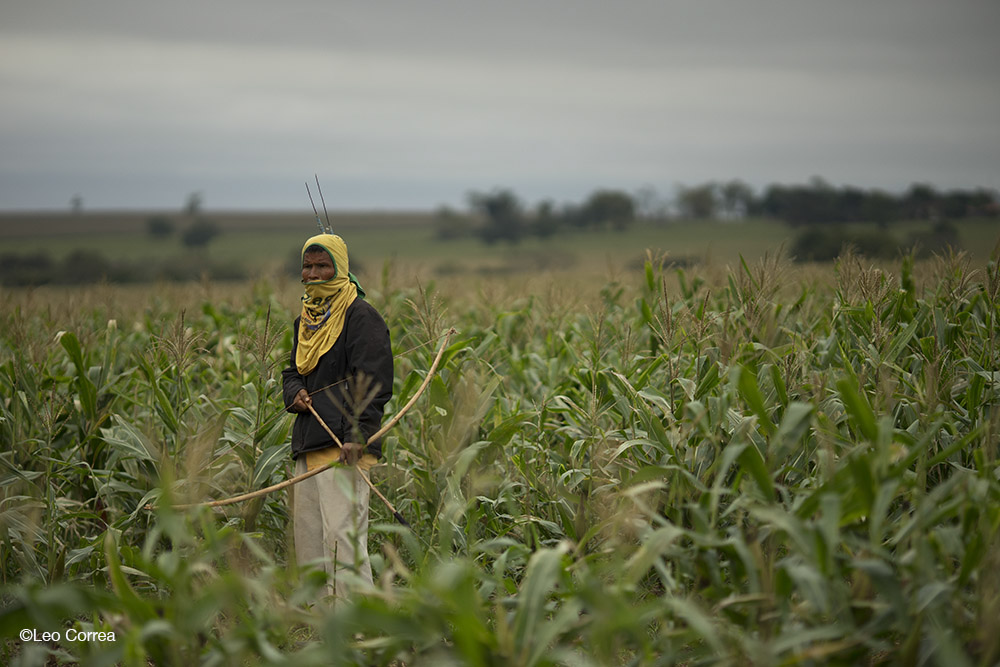
A Guarani Kaiowa indigenous stands in surveillance as he holds his arrow and bow in a corn field in Caarapo, Mato Grosso de Sul state, Brazil, Sunday, June 19, 2016. For the Brazilian federal attorney, Marco Antonio Delfino de Almeida it is a scenario of an intense violation of the Human Rights”. There is a process of radicalization developing in the area” and the acts of violences are "related to the militias created by some groups of farmers”. (Photo/Leo Correa/Redux)
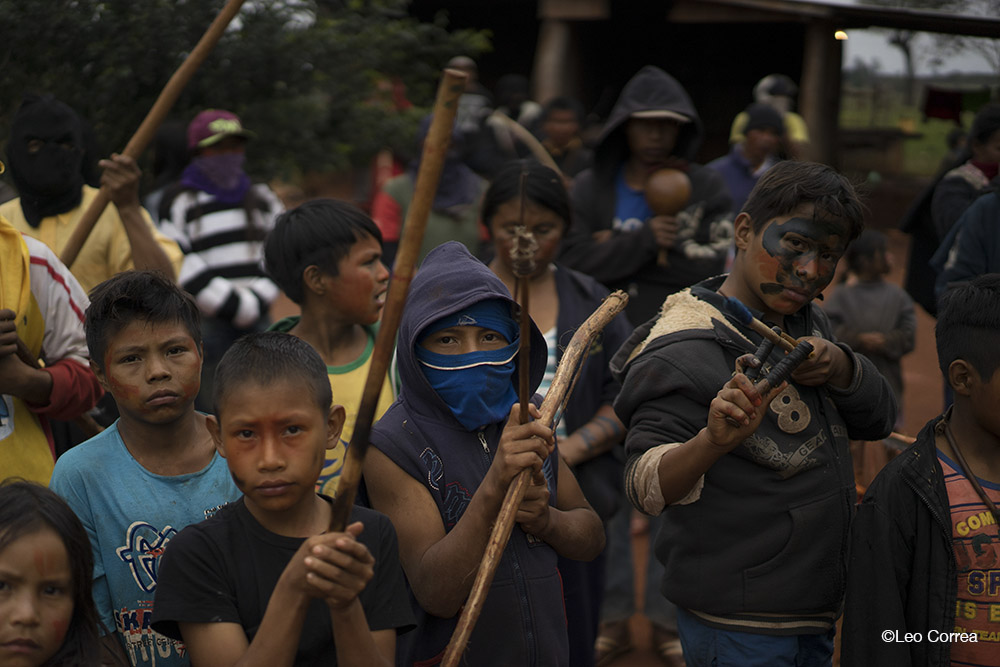
Kids of the Guarani Kaiowa ethnic group pose for the picture showing their arrow and bows at an occupied farm in Caarapo, Mato Grosso de Sul state, Brazil, Sunday, June 19, 2016. The historical rights of the indigenous people still need to be recognised by the authorities at the same time the country has to "make peace with the past and admit those mistakes, those violations and promote proper reparations… Brazil is maybe one of few countries that has not yet made peace with its past that is absolutely genocidal”, sentences the Brazilian federal attorney, Marco Antonio Delfino de Almeida. (Photo/Leo Correa/Redux)
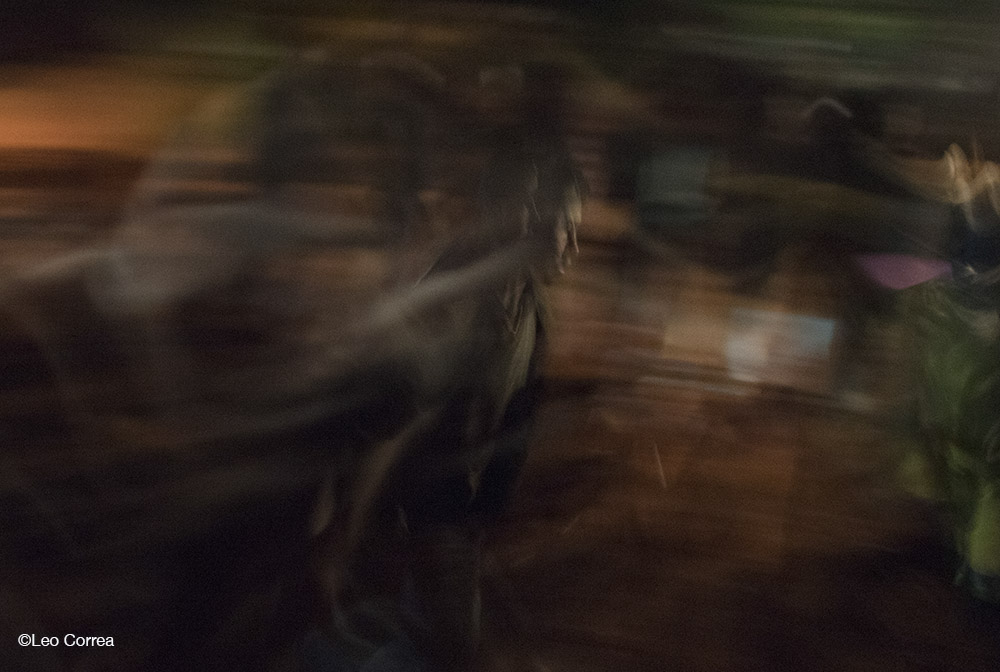
For this photo captured using a long exposure an Indigenous of the Guarani Kaiowa ethnic group dances a typical ceremony during the night at an occupied farm in Caarapo, Mato Grosso de Sul state, Brazil, Tuesday, June 21, 2016. The indigenous started a movement to return to their ancient land in several actions of retaking the lands. After the Clodiodi’s death they are risking their lives in, at least, 10 retakings areas of which they call Tekoha, that means in Guarani language: "that place of being, where they live". (Photo/Leo Correa/Redux)

Indigenous of the Guarani Kaiowa ethnic group dances a welcoming ceremony at an occupied farm in Caarapo, Mato Grosso do Sul state, Brazil, Wednesday, June 22, 2016. The indigenous started a movement to return to their ancient land in several actions of retaking the lands. After the Clodiodi’s death they are risking their lives in, at least, 10 retakings areas of which they call Tekoha, that means in Guarani language: "that place of being, where they live". (Photo/Leo Correa/Redux)
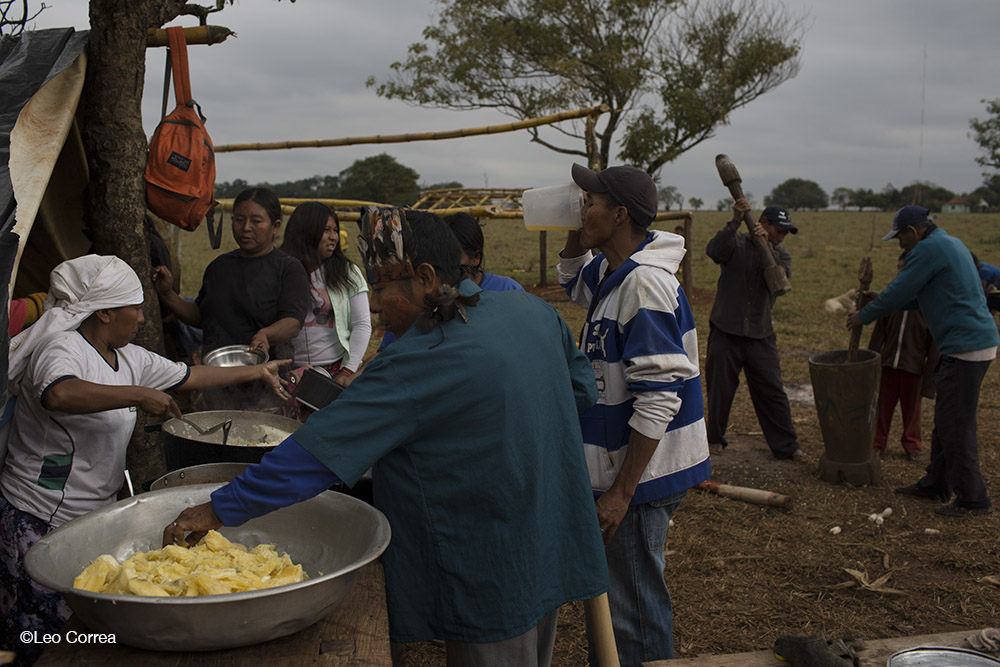
Indigenous of the Guarani Kaiowa ethnic group distribute food that they prepared at an occupied farm in Caarapo, Mato Grosso de Sul state, Brazil, Wednesday, June 22, 2016. The indigenous started a movement to return to their ancient land in several actions of retaking the lands. After the Clodiodi’s death they are risking their lives in, at least, 10 retakings areas of which they call Tekoha, that means in Guarani language: "that place of being, where they live". (Photo/Leo Correa/Redux)

An youth of the Guarani Kaiowa ethnic group aims his arrow and bow, as he tests his weapon at the occupied Yvu farm in Caarapo, Mato Grosso de Sul state, Brazil, Wednesday, June 22, 2016. The indigenous started a movement to return to their ancient land in several actions of retaking the lands. After the Clodiodi’s death they are risking their lives in, at least, 10 retakings areas of which they call Tekoha, that means in Guarani language: "that place of being, where they live". (Photo/Leo Correa/Redux)

Kids of the Guarani Kaiowa ethnic group pose for the picture at the occupied Yvu farm in Caarapo, Mato Grosso de Sul state, Brazil, Wednesday, June 22, 2016. The indigenous started a movement to return to their ancient land in several actions of retaking the lands. After the Clodiodi’s death they are risking their lives in, at least, 10 retakings areas of which they call Tekoha, that means in Guarani language: "that place of being, where they live". (Photo/Leo Correa/Redux)
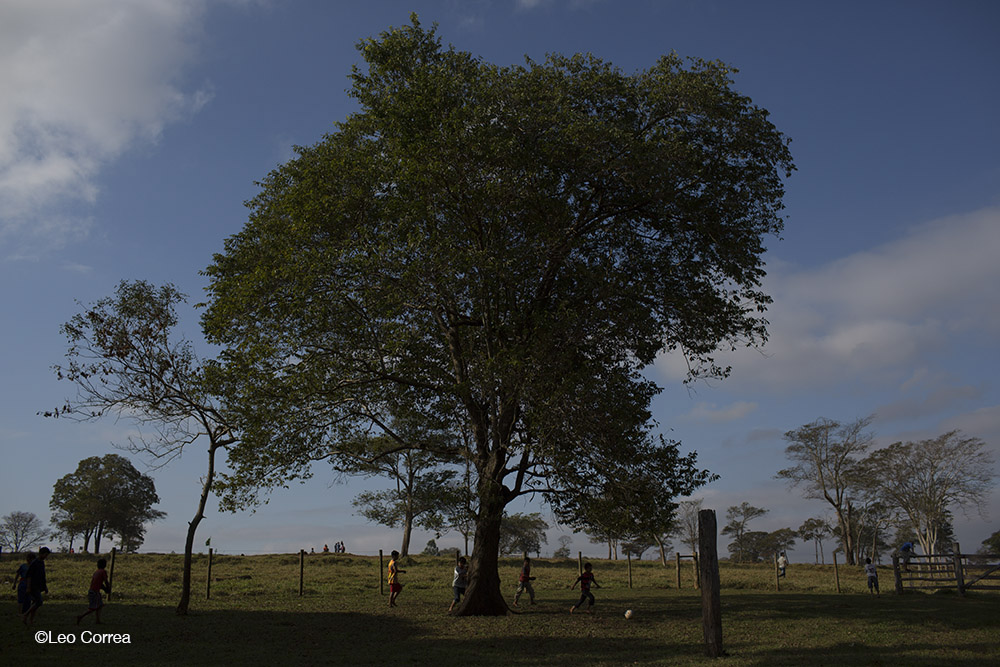
Indigenous of the Guarani Kaiowa ethnic group play soccer at the occupied Yvu farm in Caarapo, Mato Grosso de Sul state, Brazil, Wednesday, June 22, 2016. The indigenous started a movement to return to their ancient land in several actions of retaking the lands. After the Clodiodi’s death they are risking their lives in, at least, 10 retakings areas of which they call Tekoha, that means in Guarani language: "that place of being, where they live". (Photo/Leo Correa/Redux)
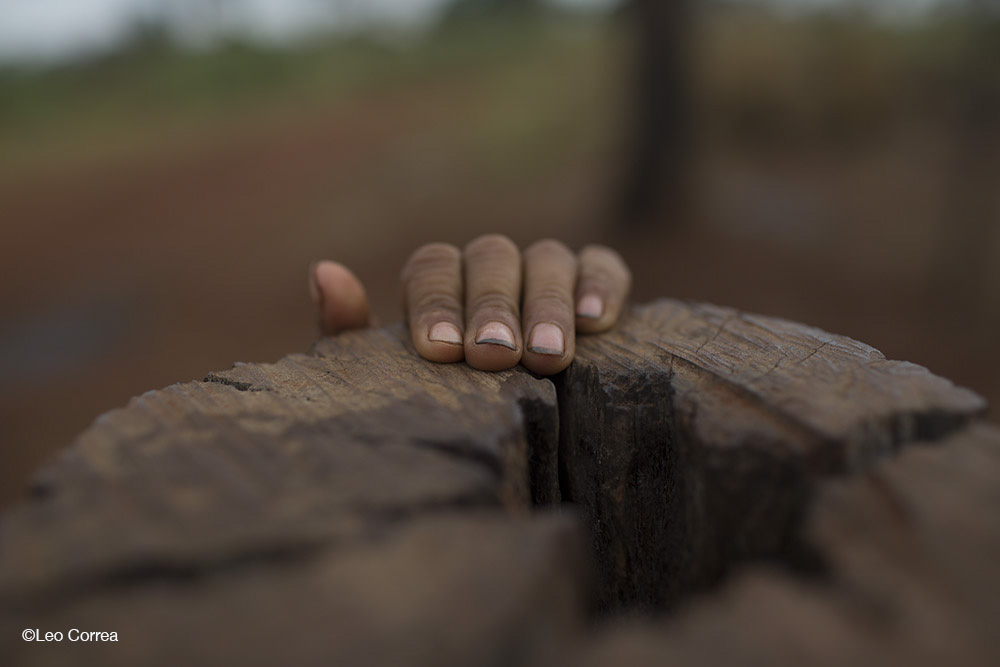
The hand of a kid of the Guarani Kaiowa ethnic group is seen over a tree trunk as he hides from the camera at the occupied Yvu farm in Caarapo, Mato Grosso de Sul state, Brazil, Wednesday, June 22, 2016. The historical rights of the indigenous people still need to be recognized by the authorities at the same time that the country has to "make peace with the past and admit those mistakes, those violations and promote proper reparations… Brazil is maybe one of few countries that has not yet made peace with its past that is absolutely genocidal”, sentences Brazilian federal attorney, Marco Antonio Delfino de Almeida. (Photo/Leo Correa/Redux)


















